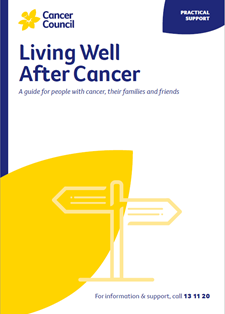- Home
- Cancer Information
- Living well
- Living well after cancer
- Fear of the cancer returning
- Checking for signs of a new cancer
Checking for signs of a new cancer
It’s important to know what is normal for you. If you notice any unusual changes in your body or have any concerns, see your GP as soon as possible. Don’t wait until your next scheduled check-up.
Learn more about:
The signs and symptoms to look for
The main signs and symptoms to look out for include:
- a lump, sore or ulcer that doesn’t heal
- a mole that bleeds or has changed shape, size or colour
- a cough or hoarseness that doesn’t go away, or a cough that produces blood
- a change in bowel habits, such as blood in your bowel movements, or diarrhoea or constipation that lasts for more than a week
- problems or changes with urinating
- persistent indigestion or difficulty swallowing
- abnormal bleeding or bruising
- unusual changes in the breasts or testicles
- abdominal (belly) pain or bloating that doesn’t go away
- unexplained changes in your general health, such as weight loss or gain, night sweats, loss of appetite and loss of energy (fatigue).
Take part in cancer screening
Screening is organised testing to find cancer in people before any symptoms appear. Australia has free national screening programs for bowel cancer (people aged 50–74), breast cancer (women aged 50–74) and cervical cancer (women aged 25–74). These are currently the only cancers in which organised screening has been shown to be effective. Trials are ongoing to develop screening programs for other cancers.
Whether these screening programs are still appropriate for you will depend on the type of cancer treatment you had. For more information, talk to your GP or call Cancer Council 13 11 20.
Podcast for people affected by cancer
Listen now
More resources
Prof Michael Jefford, Medical Oncologist and Director, Australian Cancer Survivorship Centre, Peter MacCallum Cancer Centre, VIC; Lucy Bailey, Nurse Counsellor, Cancer Council Queensland; Philip Bullas, Consumer; Dr Kate Gunn, Clinical Psychologist and Senior Research Fellow, Department of Rural Health, University of South Australia, SA; Rosemerry Hodgkin, 13 11 20 Consultant, Cancer Council WA; Prof David Joske, Clinical Haematologist, Sir Charles Gairdner Hospital and Clinical Professor of Medicine, The University of Western Australia, WA; Kim Kerin-Ayres, Clinical Nurse Consultant, Cancer Survivorship, Concord Hospital, NSW; Sally Littlewood, Physiotherapist, Seymour Health, VIC; Georgina Lohse, Social Worker, GV Health,VIC; Melanie Moore, Exercise Physiologist and Clinical Supervisor, University of Canberra Cancer Wellness Clinic, ACT; June Savva, Senior Clinician Dietitian, Nutrition and Dietetics, Monash Cancer Centre, Monash Health, VIC; Dr Elysia Thornton-Benko, Specialist General Practitioner and Research Fellow, University of New South Wales, NSW; Prof Janette Vardy, Medical Oncologist, Concord Cancer Centre and Professor of Cancer Medicine, The University of Sydney, NSW; Lyndell Wills, Consumer.
View the Cancer Council NSW editorial policy.
View all publications or call 13 11 20 for free printed copies.
Need to talk?
Support services
Life after cancer treatment
Programs and support for people who have finished treatment
ENRICH – a free healthy lifestyle program
A face-to-face exercise and nutrition program for cancer survivors
Cancer information
Staying healthy after treatment
Lifestyle changes that can help keep you in good health
View our publications
Guides and fact sheets for people with cancer, their families and friends

